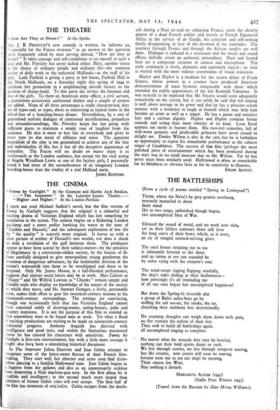THE CINEMA
" Fanny by Gaslight." At the Gaumont and Marble Arch Pavilion. The Impostor." At the Leicester Square Theatre.— "Higher and Higher." At the London Pavilion.
I HAVE not read Michael Sadleir's novel, but the film version of Fanny by Gaslight suggests that the original is a colourful and exciting drama of Victorian England which has lost something by translation to the screen. The camera begins on a flickering London gas-lamp and a street pedlar hawking his wares to the tune of "Cockles and Mussels," and the subsequent exploration of low life by " the quality" is scarcely more original. It leaves us with a clear picture of neither of Disraeli's two worlds, nor does it shock us with a revelation of the gulf .between them. The producers appear to have been scared by their subject-matter—by the penalties of illegitimacy in a convention-ridden society, by the houses of ill- fame carefully designed to give metropolitan young gentlemen the sensation of dangerous adventure, by the fashionable division of the nation's womenfolk into those to be worshipped and those to be despised. Only Mr. James Mason, in a full-blooded performance, suggests that sinister social forces may be at work. Miss Calvert as "Fanny" and Mr Wilfrid Lawson as " Chunks " remain simple and friendly souls who display no knowledge of the nature of the society in which they move, and Mr. Stewart Granger, a lively, personable actor, makes little effort to gear his twentieth-century manner to his nineteenth-century surroundings. The settings are convincing, though one occasionally feels that late Victorian England cannot have consisted solely of drawing-rooms, eating-houses, pubs and country mansions. It is not the purpose of this film to remind us that somewhere were to be found men at work. Yet what a flood of exciting productions are waiting to be made on nineteenth-century industrial progress. Anthony Asquith has directed with intelligence and good taste, and within the limitations mentioned above he has created his characters with sensitivity. Fanny by Gaslight is first-rate entertainment, but with a little more courage it might also have been a stimulating historical document.
In The Impostor Julien Duvivier and Jean Gabin attempt to recapture some of the bitter-sweet flavour of their French film- making. They start well, but director and actor soon find them- 'elves dancing to a familiar Hollywood tune. Jean Gabin begins as a fugitive from the gallows and dies as an unnecessarily reckless hero destroying a Nazi machine-gun nest. In the first phase he is credible and intelligent ; in the second much more stupid than admirers of former Gabin roles will ever accept. The first half of he film has moments of orig:nality. Gabin escapes from the death- eath-
cell during a Nazi air-raid on collapsing France, steals the identity papers of a dead French soldier and travels to French Equatorial Africa in the service of de Gaulle, his cynicism and self-seeking finally disappearing in face of the devotion of his comrades. The journeys through France and through the African jungles are well done. Dialogue is reduced to a minimum and the music and sound effects skilfully create an authentic atmosphere. Dust and humid heat are a composite creation of camera and microphone. The early continuity is lively, dramatic and supremely logical ; no time is wasted with the more tedious conventions of visual transition.
Higher and Higher is a medium for the screen debut of Frank Sinatra, whose powers as a crooner have produced American demonstrations of mass hysteria comparable with those which attended the public appearances of the late Rudolph Valentino. It was scarcely to be expected that Mr. Sinatra would seem adequately remarkable on the screen, but it can safely be said that hitt singing is well above average in its genre and that he has a pleasant screen manner with a tendency to laugh at himself which may help him become an actor as well as a singer. He has a gaunt and sensitive face and a curious dignity. Higher and Higher contains better comedy and acting than most vehicles of its kind. Leon Errol appears too rarely in feature films. His two-reel comedies, full of well-worn gestures and predictable grimaces have never ceased to delight me. Dooley Wilson is also in the cast, but he is forbidden an opportunity to repeat his remarkable performance as the cabaret singer of Casablanca. The success of that film (perhaps the most polished piece of entertainment which has been produced during the war) was in no small measure due to Mr. Wilson. Yet he has never since been similarly used. Hollywood is often as remarkable for its blindness to obvious facts as for its sensitivity to illusions.
EDGAR ANSTEY.


























 Previous page
Previous page